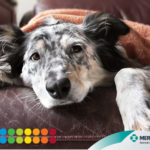The Importance of an Annual Physical Exam:
It’s Not Just About the Vaccines Anymore
Pets can’t talk, so they can’t tell us when they are not feeling well. They won’t whine when their joints hurt, they won’t usually stop eating when their teeth hurt, and they often show no outward signs in the early stages of chronic disease. From species to species, clinical signs of illness can vary significantly. Cats are a good example: symptoms can be so subtle that by the time the owner notices that a cat is sick, the animal may already be in serious trouble. This is the very reason why we recommend that all pets, regardless of their age or perceived health, be seen at least yearly for a physical exam. Older animals, or those with known disease conditions, may need to be seen every three to six months. Though it may be the vaccine reminder that brings an owner in, vaccination is actually among the least important parts of managing an animal’s health.
At Pismo Beach Veterinary clinic, we are experts in detecting subtle physical signs in an animal patient, and it all starts with a physical exam. We start at the head evaluating eyes, ears, teeth, mouth and lymph nodes and work our way back: listening to the heart and lungs, palpating internal organs in the abdomen, and of course taking that dreaded temperature! This quick but crucially important physical exam allows us to make appropriate health care recommendations for your pet. Since we don’t see your pet everyday, it is easier for us to spot subtle changes like new lumps and bumps, weight gain or loss, and changes in demeanor or attitude.
This post is to download grow boxlatest version. As we all know, ShowBox is one of the greatest movies applications ever come
The following are some examples of frequently overlooked aspects of managing a pet’s health as well as some common disease conditions that we may diagnose at your annual physical exam:
- The practice of protecting your dog from diseases by vaccination and from parasites such as worms, fleas, and ticks should start during puppy-hood and continue throughout his/her lifetime. Parasites can not only act as a way to spread disease to your pet, but also to family members – especially children and those with weaker immune systems. Vaccines, especially in young animals, are an important part of assuring that your animal is well protected from serious infectious diseases.
- How many people look in their pet’s mouth, especially cat owners? Over 85% of pets over the age of three have some degree of dental disease. If we take the idea that a pet year is worth seven human years, a five year old cat that has never had a dental cleaning is like a thirty five year old person whose teeth have never been brushed! Can you imagine? If left untreated, dental disease has been shown to have impacts on the heart, kidneys, and lungs and can take years off your pet’s life.
- Itchy skin and skin and/or ear infections are among the most common things that we see in our patients. Most of these issues boil down to allergies and can in many cases be significantly improved with over-the-counter medication, diet, and parasite control. The key ingredient is consistency and an open line of communication. This allows for a custom-catered approach to managing your pet’s allergic conditions.
- Unfortunately, just like the rampant problem we see in humans, obesity is a huge issue with dogs and cats. Our perception of what a “normal” pet is supposed to look like is generally quite skewed because the average pet is now overweight. Lifespan studies have shown that obesity is a significant risk factor for arthritis as well as other medical conditions, and can actually take years off your pet’s life. At Pismo Beach Vet, we not only keep an accurate and ongoing record of your pet’s weight, but can advise you on some simple things you can do to improve the animal’s body condition. It is easy to get offended, but remember that your our job is to help promote long, healthy, and happy lives for all of your pets!
Thanks to advances in veterinary medicine, pets are living longer than ever before. However, with this increased lifespan comes an increase in the types of ailments that can afflict senior pets. As pets reach the golden years there are a variety of conditions and diseases that they can face, including weight and mobility changes; osteoarthritis; kidney, heart, and liver disease; hormone or metabolic disorders such as diabetes and hyper- or hypo-thyroidism; and of course cancer.
- Degenerative joint disease (arthritis) is the number one cause of chronic pain in dogs and cats. A friend of mine was asking me for weeks about her dog who had begun “sitting funny” but showed no other signs of pain or illness. I encouraged her to see her regular vet. She eventually scheduled a physical exam and the pet was put on anti-inflammatory pain medications. She saw such an enormous improvement in her animal’s activity level that she actually thought the pain medications must include some sort of stimulant! What really happened is that her dog had been living with chronic pain for months or years and she had not noticed because he did not complain.
- Nearly 20% of senior female dogs are walking around at any given time with a urinary tract infection but may show little or no outward signs. A simple urine panel can enable us to diagnose and treat this problem.
- Over 10% of cats over the age of ten have the beginnings of chronic kidney disease. The earlier we diagnose this condition with routine blood work, the better our chances of slowing the progression of the disease.
These are but a few examples of the importance of regular check-ups with your veterinarian. Ultimately, with advances in diagnostic testing and training, our focus in veterinary medicine has shifted from reactive to preventative medicine. Annual examinations and periodic blood screening allow us to diagnose or prevent disease before it becomes advanced or even occurs at all, thereby improving both the quality and the length of life for those important members of your family.
 Click here to download this document in WORD…
Click here to download this document in WORD…







